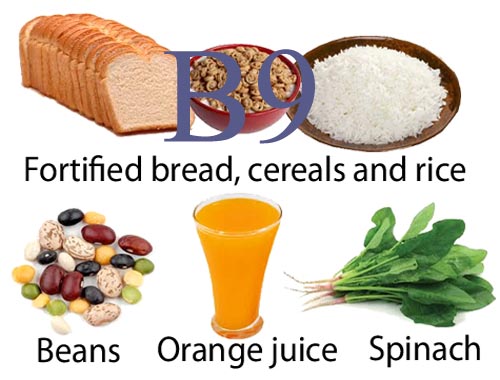Folate deficiency

Published: 18 Jun 2025
ICD9: 281.2 ICD10: D52.9 ICD11: 5B5E
Folate deficiency is a condition that occurs when the body doesn't have enough folate, also known as vitamin B9.
Folate is crucial for many bodily functions, including:
![]() Cell growth and division: Folate is essential for the synthesis of DNA and RNA, the building blocks of cells. This is especially important during periods of rapid growth, such as pregnancy and infancy.
Cell growth and division: Folate is essential for the synthesis of DNA and RNA, the building blocks of cells. This is especially important during periods of rapid growth, such as pregnancy and infancy.
![]() Formation of red blood cells: Folate helps produce healthy red blood cells, which carry oxygen throughout the body.
Formation of red blood cells: Folate helps produce healthy red blood cells, which carry oxygen throughout the body.
![]() Proper brain function: Folate plays a role in brain development and function.
Proper brain function: Folate plays a role in brain development and function.
Causes of Folate Deficiency:
![]() Inadequate dietary intake: Not eating enough folate-rich foods is the most common cause. Good sources of folate include:
Inadequate dietary intake: Not eating enough folate-rich foods is the most common cause. Good sources of folate include:![]()

![]() Leafy green vegetables (spinach, kale, romaine lettuce)
Leafy green vegetables (spinach, kale, romaine lettuce)![]()

![]() Fruits (citrus fruits, bananas, melons)
Fruits (citrus fruits, bananas, melons)![]()

![]() Beans and legumes (lentils, chickpeas, kidney beans)
Beans and legumes (lentils, chickpeas, kidney beans)![]()

![]() Fortified grains (breads, cereals, pasta)
Fortified grains (breads, cereals, pasta)![]()

![]() Liver
Liver
![]() Malabsorption: Certain medical conditions can interfere with the body's ability to absorb folate from food, such as:
Malabsorption: Certain medical conditions can interfere with the body's ability to absorb folate from food, such as:![]()

![]() Celiac disease
Celiac disease![]()

![]() Crohn's disease
Crohn's disease![]()

![]() Ulcerative colitis
Ulcerative colitis![]()

![]() Gastric bypass surgery
Gastric bypass surgery
![]() Certain medications: Some medications can interfere with folate absorption or metabolism, including:
Certain medications: Some medications can interfere with folate absorption or metabolism, including:![]()

![]() Methotrexate (used to treat cancer and autoimmune diseases)
Methotrexate (used to treat cancer and autoimmune diseases)![]()

![]() Sulfasalazine (used to treat ulcerative colitis and rheumatoid arthritis)
Sulfasalazine (used to treat ulcerative colitis and rheumatoid arthritis)![]()

![]() Anticonvulsants (used to treat seizures)
Anticonvulsants (used to treat seizures)
![]() Alcohol abuse: Alcohol can interfere with folate absorption and metabolism.
Alcohol abuse: Alcohol can interfere with folate absorption and metabolism.
![]() Pregnancy: Pregnant women have increased folate needs to support the developing fetus.
Pregnancy: Pregnant women have increased folate needs to support the developing fetus.
![]() Hemodialysis: People on hemodialysis can lose folate during the procedure.
Hemodialysis: People on hemodialysis can lose folate during the procedure.
![]() Genetic defects: Rare genetic disorders can affect folate metabolism.
Genetic defects: Rare genetic disorders can affect folate metabolism.
Symptoms of Folate Deficiency:
Symptoms can vary depending on the severity of the deficiency. Some people may not experience any symptoms at all, while others may have:
![]() Fatigue and weakness: Due to anemia (low red blood cell count).
Fatigue and weakness: Due to anemia (low red blood cell count).
![]() Pale skin: Another sign of anemia.
Pale skin: Another sign of anemia.
![]() Irritability: Folate deficiency can affect mood.
Irritability: Folate deficiency can affect mood.
![]() Mouth sores or tongue swelling: Folate is important for the health of the mucous membranes.
Mouth sores or tongue swelling: Folate is important for the health of the mucous membranes.
![]() Changes in skin, hair, or nail pigmentation: In some cases.
Changes in skin, hair, or nail pigmentation: In some cases.
![]() Poor growth: In children.
Poor growth: In children.
![]() Neural tube defects: In babies born to folate-deficient mothers (such as spina bifida).
Neural tube defects: In babies born to folate-deficient mothers (such as spina bifida).
![]() Diarrhea: In some cases.
Diarrhea: In some cases.
![]() Shortness of breath: Due to anemia.
Shortness of breath: Due to anemia.
Diagnosis:
Folate deficiency is usually diagnosed with a blood test to measure folate levels. Other tests may be done to rule out other causes of anemia or malabsorption.
Treatment:
The treatment for folate deficiency typically involves:
![]() Folate supplementation: Taking folate supplements orally, as prescribed by a doctor.
Folate supplementation: Taking folate supplements orally, as prescribed by a doctor.
![]() Dietary changes: Increasing the intake of folate-rich foods.
Dietary changes: Increasing the intake of folate-rich foods.
![]() Addressing underlying causes: If the deficiency is caused by malabsorption, medications, or other medical conditions, those need to be addressed.
Addressing underlying causes: If the deficiency is caused by malabsorption, medications, or other medical conditions, those need to be addressed.
Prevention:
Folate deficiency can be prevented by:
![]() Eating a balanced diet: Including plenty of folate-rich foods.
Eating a balanced diet: Including plenty of folate-rich foods.
![]() Taking folic acid supplements: Especially important for women of childbearing age and pregnant women.
Taking folic acid supplements: Especially important for women of childbearing age and pregnant women.
![]() Avoiding excessive alcohol consumption:
Avoiding excessive alcohol consumption:
![]() Talking to your doctor: About any medications or medical conditions that could interfere with folate absorption.
Talking to your doctor: About any medications or medical conditions that could interfere with folate absorption.
Importance of Folate:
Folate is particularly important for women of childbearing age because it helps prevent neural tube defects in developing fetuses. The neural tube closes very early in pregnancy, often before a woman even knows she is pregnant. Therefore, ensuring adequate folate intake *before* conception is vital.
In summary, folate deficiency is a condition caused by a lack of folate in the body, which can lead to a range of health problems. It's important to consume enough folate through diet or supplements, especially for pregnant women and individuals with certain medical conditions. If you suspect you have a folate deficiency, consult with a healthcare professional for diagnosis and treatment.